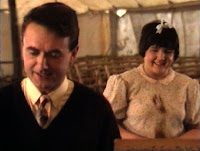There were ninety and nine that safely lay
In the shelter of the fold.
But one was out on the hills away,
Far off from the gates of gold.
Away on the mountains wild and bare.
Away from the tender Shepherd’s care.

One of the joys of this year’s Belfast Film Festival is that the BBC are running free screenings of a variety of programmes from their archive. Tomorrow sees the return of Doctor Who and the City of Death and Quatermass and the Pit. Mother’s Day hasn’t prevented both screenings selling out.
But this afternoon, a Play for the Day written by Northern Ireland born author and producer Maurice Leitch and originally transmitted on the BBC in 1983 was dusted down and screened to a packed audience in Broadcasting House.
Gates of Gold is set in rural Co. Antrim back in 1959. Fourteen year old Grace lives with her foster parents on a farm. She has a learning disability, but helps out on the farm. Her Dad has allowed a travelling tent mission to set up in one of his fields.
The film mimics Grace’s sporadic speech, starting very slowly, with noises of the countryside and very little dialogue. There’s real attention to detail that reminds me of visiting relatives’ homes in the Glens of Antrim: the farm house clock ticking away loudly in the background of every downstairs conversation.

Intrigued by the sound of an organ, Grace explores the “canvas cathedral” and is befriended by the youthful George McQuiston (Bryan Murray who later played Brookside’s Trevor Jordache), even joining in to sing along as he practices his playing.
On the mission’s first evening, Pastor Eric Kells speaks to a full tent. He cites the 100th anniversary of the 1859 revival in the region. While the opening music was joyful, his message is serious and hell-bent.
“Feel the powerful rays of salvation coming down from the mercy seat … feel the burning rays …”
George is invited up to give his “powerful” testimony.
“Friends, before I discovered that ‘laundry of love’ I smoked; I drank alcohol; I gambled; I spent my money on other things I’m too ashamed to mention tonight; … on one occasion I even stole.”
The rhetoric’s emotion is turned up along with the accompanying organ music and singing in the background as Pastor Kells begins the altar call. Grace stands to go forward but her parents restrain her and make her sit down. But she’s a changed girl, tackling her tasks around the farm with renewed enthusiasm and a smile on her face.
There are numerous tensions throughout the well-crafted 68 minute television play. Grace’s mother is very hard on her foster child – “I’m determined the while that child is in my care she’ll be protected from herself” – and clashes with her more laid back husband.
Pastor Kells and George aren’t a happy partnership, and fall well short of the ideals they preach. Kells is found of “the devil’s buttermilk” and George is passionate about more than just music.
And finally, the straight-laced local Presbyterian minister is unimpressed with the “lurid import” from across the Atlantic that is leading his congregation astray.
“I have been hearing disturbing accounts of what has been happening [in the crusade tent] … Much noise and a good deal of hysteria … Although the scriptures say the Lord’s house has many mansions … [this] does not give man licence to abandon old forms of worship or invent new ones … sensationalism imported from the United States of America … Join me in saying no – a resounding no – to this crude and dubious enterprise.”
As I watched, I was challenged by the emptiness and joylessness of most of the religion being portrayed on the screen. The tent crusade had emotion and music, but it drove people to faith more through a message about hell than expounding the “laundry of love”. And the traditional indigenous congregation lacked any sensible connection to the modern world with which to engage those sitting on the pews.
“Our old fashioned ways have stood the test of time.”
Or perhaps the old fashioned ways continued to bore people senseless and accurately relate to so little of their lives and communities that your message continues to bypass them and leave them uninspired?
Possibly the most Christ-like character in the programme was Grace’s foster dad. Hard working and hen pecked, he was generous with his land, appreciated his daughter’s help, understood the need to make allowances for her, encouraged her, and tried to keep her out of trouble. He could sense her change in attitude after her tent experiences, and it didn’t frighten him. Of all the characters, he related most honestly to Grace.
Sitting in 2011 watching Gates of Gold I wonder how much our attitudes to learning disabilities have changed since 1959. I also wonder whether the 1983 judgement on 1959 Christian services would be any less painful if it looked at today’s expression of church?
Like a good play or a good film, it leaves you with more questions than answers.
(The lovely couple sat next to me left with even more questions since they were expecting to see an adaption of Frank McGuinness’ 2006 play Gates of Gold rather than a very different story of life and love!)
No comments:
Post a Comment